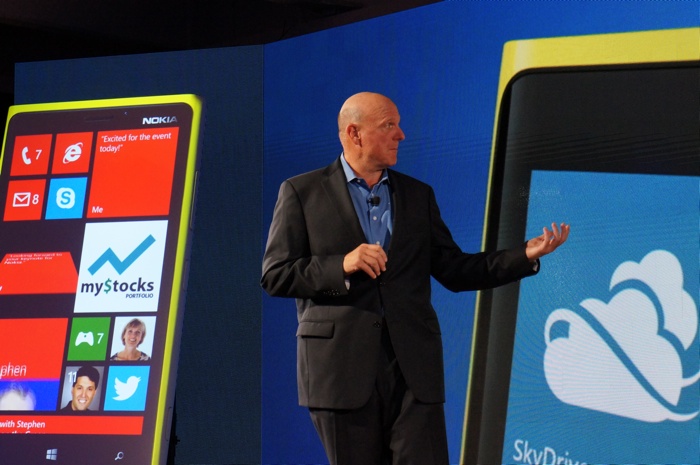In a deal that many saw coming, Microsoft just announced that it’s acquiring Nokia’s devices and services business for more than $7 billion in cash.
Microsoft will pay $5 billion for Nokia’s devices division and $2.18 billion to license Nokia’s patent portfolio. Microsoft will also license Nokia’s extensive mapping technology. The deal is expected to close in the first quarter of 2014 and is subject to approval by shareholders and regulators.
“Nokia will now write its next chapter, focused on enabling mobility through its leadership in networking, mapping & location, and advanced technologies,” Microsoft CEO Steve Ballmer and Nokia CEO Stephen Elop wrote in a joint blog post. “For Microsoft as well, today is a bold step into the future, a huge leap forward on our journey of creating a family of devices and services that delight people and empower businesses of all sizes.”
Elop is stepping away from his CEO role to become the executive VP of devices and services at Microsoft. A former Microsoft exec from before he joined Nokia, Elop was already a strong candidate to replace Ballmer after he retires. Now Elop is an even far likelier candidate to rule Microsoft.
The news is a good sign for Windows Phone. Now Nokia will be able to deliver killer devices with even greater support from Microsoft (though the two have been cozy since Nokia agreed to dump Symbian for Windows Phone), and it gives Microsoft a killer smartphone hardware maker of its very own. (I also can’t help but feel vindicated after arguing for years that Microsoft and Nokia were a good match.)
If Google’s acquisition of Motorola Mobility begat the Moto X, a surprisingly solid and innovative Android phone, then all eyes will be on Microsoft and Nokia to deliver something equally as innovative. I adored Nokia’s astounding camera hardware in the Lumia 1020, but that enthusiasm was crushed by Windows Phone’s inability to keep up with Android and iOS today.
Microsoft was rumored to be working on a “Surface phone,” which it would have built itself just like the Surface tablet. But tonight’s announcement likely killed off any hope of that for now. It wouldn’t make sense for Microsoft to pursue an older project now that it has full control of Nokia (then again, this is the same company that released the woefully misguided Kin phones).
While this deal is mostly good news for Windows Phone, it could mean trouble for the few third-party smartphone makers who helped launch the platform (specifically, Samsung and HTC). Given Windows Phone’s slow sales overall, and Nokia’s dominance of what little sales the platform had, I figure Microsoft won’t care if its partners jump ship.
For better or worse, Microsoft is also buying Nokia’s legacy (or at least, as much as it can without owning the Nokia brand). The Finnish phone company used to be the king of the mobile world, but it was toppled in just a few years by the rise of the iPhone and smartphones in general. Despite Nokia’s missteps, many consumers likely still have fond memories of their first Nokia phone.
And with Nokia’s Asha low-end feature phones, the acquisition also gives Microsoft instant access to millions of people in emerging markets, which could pay off for Windows Phone when those users are ready to upgrade to something smarter.
In their blog post, Ballmer and Elop say that the acquisition means Microsoft can now “realize the full potential of the Windows ecosystem.” Read another way, it sounds like they’re admitting Microsoft has squandered some of that potential so far.


